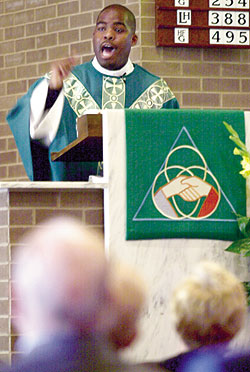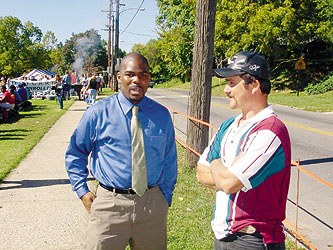"Our church is called Grace, and the word 'grace' in Greek means 'gift.' We are called to give gifts to people."
Pastor Greg Manning '96 is blessed with extraordinary vision.

Epiphanies occur when we least expect them. For Greg Manning, the moment came while he was tending a flower garden in a rundown Fort Wayne neighborhood.
The Lutheran Church Missouri Synod ordained Manning as a pastor in 2000 and gave him his first assignment with his home congregation in Fort Wayne, where he had grown up and done community outreach work throughout his three years at Concordia Theological Seminary. The church maintained a small inner-city apartment as a community center and a base of operations for its neighborhood ministry. Manning took over as director of the facility, meeting with folks who needed guidance. He was planting flowers out front when he heard God's word, coming from the mouth of an elderly neighborhood woman who leaned over his shoulder.
"I'm sure you don't remember me," she said. "But I remember you and your brothers. When you were a little boy, I used to bring you cookies at this very same apartment. You were the nicest, kindest boys. You go back and ask your mom."
Disbelieving, Manning did ask his mother, Gail Gorman, about the woman, and she confirmed the story. More than 20 years prior, his mother had moved him and his brothers--and they moved often--into the same apartment unit that Manning now used to do good deeds in the neighborhood. If ever he had any doubt that a life of religious service was what God intended for him, it disappeared the moment he realized that a remarkable series of events had delivered him back to the very place of his difficult childhood.
"That was just amazing to me," says Manning. "God had brought me full circle in my life. It gave me a greater understanding of the providence of God, that the Lord does have a plan for everything.
"But it was not a happy childhood," he says of those early years. "I saw a lot of bad days."
When Manning and his brothers were still young, their mother fled an abusive relationship with Manning's stepfather, and for most of his youth they moved constantly, from one low-income neighborhood to the next. As if the hardships of poverty and transience weren't enough of a challenge, Manning, from birth, suffered from a rare congenital disease called Leber's optic atrophy that left him 96-percent-blind. He sees well enough to get around, but he can't drive and has difficulty reading normal-sized type.
But you won't hear Manning complain. His mother, the most important role model in his life, never let obstacles keep the family from living a good life.
"In all that she had gone through, surviving an abusive marriage and raising three boys, her strength gave me the ambition to overcome," says Manning. Gail Gorman made sure her sons avoided the pitfalls of drugs and crime prevalent in the neighborhoods in which circumstances forced them to live. She kept them involved in the Lutheran Church, always a source of comfort for Manning in difficult times (he says he knew he would be a pastor at four years old). She managed to put them through private schools and encouraged Manning to pursue positive activities such as acting, which many of Manning's Wabash classmates will remember as one of his finer talents. "My mom always told me and my brothers that we could do anything or become anything we wanted," he says, "that as long as we worked hard, we could go a lot of places."
In high school, Manning came under the influence of a family friend, a Wabash alumnus, who saw in the youth the makings of an exceptional Wabash man. But on reporting to campus the next year, Manning, already adept at meeting challenges, found that adjusting to college life would entail more than adopting good study habits. Delta Tau Delta, Manning's fraternity, had a policy of pairing freshmen with different backgrounds in the same rooms as a way to encourage them to form bonds. Manning was an African American from the inner city. His roommate was, at the time, an avowed racist. "I found out later that he wrote letters to his girlfriend saying he was going to lynch me," remembers Manning.
By the end of the year, however, the two became close friends, and have remained so to this day. After his ordination, Manning even performed the ceremony at his pledge brother's wedding. "His best man was another friend of ours, also African American," says Manning. "We stood up there, in his home town, where everybody knew that he had been a racist. I just looked at him and said, 'Well, certainly today everyone's going to know that you've changed.' We had a cultural barrier and we got beyond it."
Manning's family encountered another cultural barrier during his college days. In Crawfordsville to see her son's performance in a play, Gail Gorman and her daughter were walking down Grant Avenue when Manning's sister became alarmed.
"She told my mom, 'We need to walk fast; this is the kind of town where people are likely to give us trouble.' My mom told her that sort of thing only happens in towns like this in the movies, and just a few steps later, this truck pulled around a corner and the guy yelled, 'Nigger' out the window.
"We have to tear down barriers and stereotypes, and that's what I try to do--to tear down the walls that separate cultures," Manning says as he recalls the incident.
"With his spirit, Greg is uniquely equipped to cross those kinds of boundaries," says Wabash religion professor emeritus Raymond Williams, whom Manning names as one of his most important college influences (Williams even took part in Manning's ordination ceremony).
 | |
|
Manning takes a break from a church festival for the neighborhood to talk with a member of his congregation.
|
When Manning got there, Grace Lutheran was serving the religious needs of a small group of devoted followers who drove in from the suburbs to worship. At the same time, the worshippers largely turned a blind eye to the very pressing needs of the people in the community where the church is located.
"I've always felt that a church should be multicultural," Manning says. "You should look out over the congregation and see what I call 'a picture of heaven.' Because in heaven there are going to be all kinds of people, and that's the way a church should look."
Since arriving at Grace Lutheran nearly three years ago, Manning's goal has been to make this "picture of heaven" a reality. Despite occasional protests from some longtime congregation members, he has brought the neighborhood back into the church for outreach programs and youth ministries. And when he sees a member of the congregation walk past someone from the community in a hallway without offering a greeting, Manning is quick to stop them both. "Do you know this person?" he asks. "Have you addressed them?"
The basketball nights Manning has organized in the church gym have become a popular attraction for the young men of the neighborhood, many of whom Manning describes as "at-risk." And Manning, with his uncompromisingly firm and forthright approach, has grown to be the most respected man in many of their lives. In this setting he counts his visual impairment among his most important assets.
"In the work I do, I have a lot of youth come up with tons of excuses," says Manning. "Why they can't do this or that, and why things are harder for them. But I'm able to say, 'Look, I can't even see very well. I've had to deal with this all my life. And it never forced me to make excuses for why I can't make good grades or why I can't achieve the goals I have in life.'"
Manning still has a long way to go to achieve his vision for Grace Lutheran. While he has effectively opened the church's doors to those who were once shut out, he has had difficulty getting people in the neighborhood to feel comfortable enough to worship with the congregation on Sundays.
"We've lost a lot of people," Manning says. "We started with about 200, and we went up to about 250 when I first got here, because there aren't many African American ministers in the Lutheran Church and I was a kind of novelty. But as soon as they realized I wasn't going to cater to making them feel comfortable, they stopped coming, and some people who'd been in the congregation for a long time left, too.
"Welcoming in people that didn't talk like they did, didn't look like they did, made a lot of people uncomfortable. People aren't used to associating with people seemingly so different than themselves, so it takes work. But it's good work. I just can't stand for us to be so afraid of each other."
And Manning's work to confront such fear has not gone unnoticed. Last year, the Associated Press ran a story on the national wire about Manning's endeavors. And his accomplishments caught the attention of the church leadership. Eager to duplicate his efforts in other congregations, the district offered him the opportunity to work as a director of community outreach for the entire Kansas City area. That proposal brought Manning to what may be one of the most telling decisions of his young vocation.
"I decided to stay here at Grace."
Manning reflects: "I've been here two-and-a-half years, and God has blessed me, built this rapport with these people. I'm surrounded constantly by young men who have never had a father or a father figure in their lives. The thought of not being here for them breaks my heart."
Echoing in that heart were the words of a young man who was 14 when Manning arrived and who has since "become a son" to him.
"He said, 'You're not going to be here long. Good things may come here, but they don't stay for long.' I told him I was here for as long as God would have me. And I don't want to leave now."
Such relationships strengthen Manning's determination to serve his congregation and neighborhood and steel his insistence that they serve one another.
"Our church is called Grace, and the word 'grace' in Greek means 'gift.' We are called to give gifts to people."
Some gifts given aren't what the recipient would have wished for at first. Manning recalls the relationship he has forged with another young man.
"Eddy would always address me, but he would never look me in my eyes," says Manning. "One day I said to him, 'You know what? I can't believe a man who won't look me in the eyes.' I learned later that Eddy was a drug dealer. But about six months ago, he was telling me how broke he was. I said, 'Do you remember when you first started coming to church and you couldn't look me in my eyes?' He said, 'Yeah, I couldn't look you in your eyes because I was a drug dealer, making $2,500 a week. But ever since I started looking you in your eyes, I'm broke.'"
"There has never been a time when the church more badly needed strong, wise people to enter the ministry," says Professor Williams. "We now need that kind of leadership to live together peacefully in American society."
And in his breakthrough with men like Eddy, as well as in the bridge-building he has done in his Kansas City church, Manning is proving that it's not what you can see that matters. It's what you can see in others.